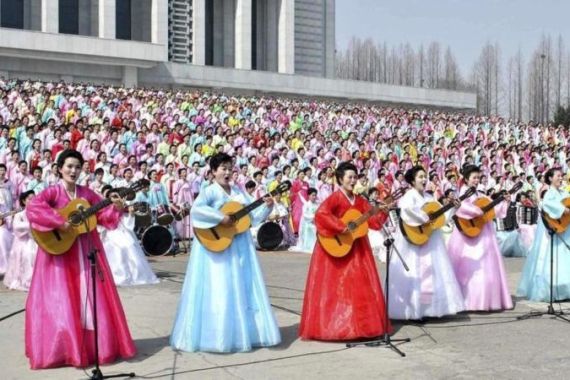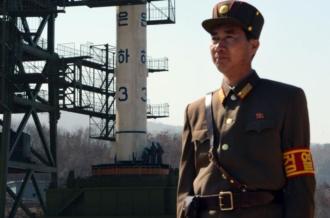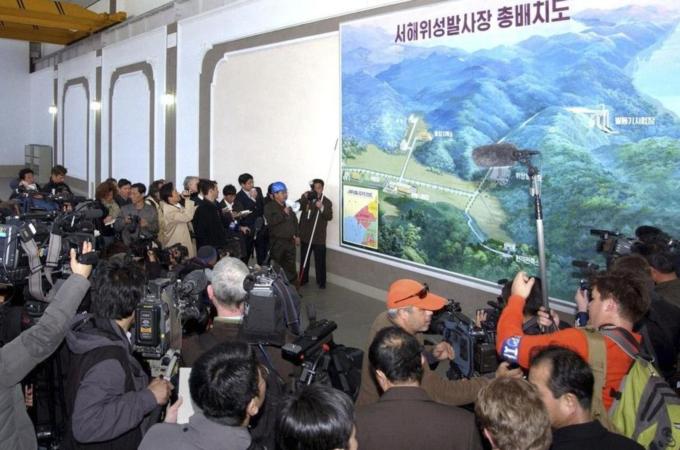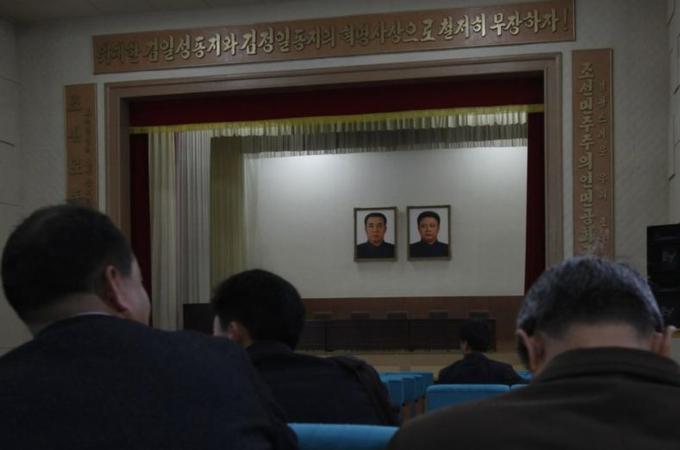North Korea celebrates ‘Juche 101’
Three East Asia experts explain why Pyongyang is going all-out to honour the centenary of the “eternal president”.

As the Democratic People’s Republic of North Korea (DPRK) heralds an imminent rocket launch from the Tongchang-ri site, its neighbours anxiously await the fallout.
While the North says the send-off is merely to put a civilian satellite into space, the country’s adversaries have denounced what they describe as provocation by Pyongyang.
The reclusive communist site has for years been planning festivities – including the missile test – surrounding the 100th birthday on April 15, 2012, of founding president Kim Il-sung. Other activities for the centenary include: an Arirang mass games spectacle in which more than 100,000 people perform a highly co-ordinated gymnastic and theatrical show; dedication of construction projects such as the 330-metre-high Ryugyong Hotel, which was begun in 1987; and the completion of the country’s largest-ever hydroelectric dam.
Meanwhile, the DPRK recently finished commemorating the death of the “Dear Leader” Kim Jong-il while transitioning rule to his young son Kim Jong-un.
Juche, meaning “self-reliance” in Korean, is the name of the country’s official ideology, which combines Stalinist political principles, Confucian social values and ethnic Korean nationalism.
North Korea uses an official Juche calendar whose year one is 1912, when Kim Il-sung was born. So, 2012 on the Gregorian calendar is considered Juche 101.
To understand the motivating factors behind North Korea’s celebrations, Al Jazeera’s Ben Piven spoke with Charles Armstrong, a history professor and Director of the Centre for Korean Research at Columbia University, Leon Sigal, Director of the Northeast Asia Cooperative Security Project, and Thomas Gold, a sociology professor at the University of California, Berkeley’s Institute of East Asian Studies.
Ben Piven: What can the new leader of North Korea achieve by following through with highly anticipated birthday celebrations for his grandfather, Kim Il-sung?
Charles Armstrong: This has been in the works for a while and it would have been impossible for North Korea not to hold the launch after building up the event for so long. They are very proud of the 1998 “satellite” that celebrated Kim Jong-il’s accession to the throne, even though most outside observers believe the launch failed. This [2012 launch] signifies Kim Jong-un’s accession to power and his loyalty to the memory of his father and grandfather.
 |
| A soldier stands at the Tongchang-ri space center [AFP] |
Leon Sigal: He will be carrying out the wishes of his late father. If the test-launch and nuclear test succeed, he’ll improve North Korea’s capabilities.
Thomas Gold: We need to ask first who the intended audience is. For the local elite, it is to stress the continuation of the Kim Il-sung bloodline and all that that implies, especially the continuation of privileges.
For the rest, probably same old same old – don’t get your hopes up, if you ever did. For foreign audiences, it is also a statement of continuation of the line, and don’t think because he studied abroad as a youth his thinking deviates from his predecessors’. His focus is showing that the DPRK is resolute in maintaining the Juche line and all that that implies. Kim Jung-un can achieve the sense at home and abroad that things are under control.
BP: You’ve visited North Korea in your capacity as academics. What will be the single most impressive aspect of the massive centenary festivities – Ryugyong Hotel, Arirang Games, Huichon Power Station, or something else entirely?
Armstrong: The near-completion of Ryugyong [a 105-story hotel whose construction was halted in the mid-90’s] is impressive. When I last went in June 2011, there was a lot of construction in the Mansudae area near Kim Il-sung’s giant bronze statue. In general, the appearance of construction and traffic was striking and something not seen at this scale in Pyongyang for two decades.
Sigal: The obvious signs of economic revival from the low-point of the mid-nineties, at least in Pyongyang.
Gold: For all of the planned hoopla and mass events, I think the most impressive aspect is the fact that this regime has survived this long and continues to attract the world’s attention. That is the message. Local people will be told that this is because of its strength and the resolute determination of its unified leadership and citizens to maintain the Juche line and not be beholden to or at the beck and call of outsiders, even if the reality – which most of them are unaware of – is very different.
This message is especially aimed at the US and Japan but China as well. The message shows that the DPRK enjoys great leverage, presented as “prestige” or “respect”, around the region and world, and must be consulted on important issues of the day (without indicating the real reasons). The events will demonstrate that the sacrifices that the Korean people make are well worth it. And the whole world, friends and enemies alike, are paying attention to what is going on in the DPRK, and are impressed with the continuity.
For students of social psychology, the DPRK’s sense of “presentation of self” is endlessly fascinating. What its leaders think is the impression they are giving versus what observers take away, and do the leaders care that there is such a large gap?
BP: For political analysts, there is a lot of debate about whether the North will successfully push the West to send promised food aid. Is this international drama a distraction during the Juche 101 party?
Armstrong: The North Koreans would like food aid of course but they will have the party regardless. It’s unfortunate that the US has cut off food aid because of the announced rocket launch, as the US has long said humanitarian assistance should not be linked to politics.
 |
| Jang Myong-Jin, director of West Sea Satellite Launch Site, introduces the launching process of Unha-3 (Milky Way 3) during a guided media tour by North Korean authorities in Cholsan, northwest of Pyongyang [KCNA] |
Sigal: For the North this has never been about food aid, but about the relationship with the US. That may be changing.
Gold: I think it is part and parcel of it – another display of the North’s leverage. But how it is actually presented to the citizens? [It’s unlikely average North Koreans will think] the elite is starving you into submission to preserve its privileges which are inextricably linked to the survival of the Kim dynasty. But that is a different matter. I can’t see the West not sending some aid.
BP: As Americans who have cultivated decent relations with various people in Pyongyang, do you think there is increased scope for understanding and outreach during the April 2012 period?
Armstrong: I believe it’s critical that we try but things are going to be rocky for the next little while. Once the excitement over the 100th anniversary dies down we can hopefully return to constructive dialogue.
Sigal: Absolutely not. The test-launch undercuts all those in United States who sought an improvement in relations.
Gold: I wouldn’t bet on it. Foreigners who attend these events may try to probe what “people” think of KJU or the DPRK itself – even though the only ones they meet will be officials, overt or covert, and carefully vetted citizens. But the Koreans won’t reveal their true thoughts, which might actually not differ from the official line at all.
I think the official handlers will be very preachy and arrogant. On the other hand, visitors who are capable of keeping a cool head and are willing to say what they honestly think about the place – will certainly be listened to, even if not responded to with anything but dogma.
BP: Since you also have a keen awareness of how the Chinese government plays a role in Northeast Asia, will Beijing be as happy to honour this Communist legend’s birth anniversary?
Armstrong: The Chinese are concerned but there’s not much they can do about it. Publicly they praise Kim Il-sung and his achievements. Privately they are unhappy with the direction his son took the country and are waiting to see how the grandson does.
 |
| People rest inside a theatre featuring portraits of North Korean leader Kim Il-sung and his son Kim Jong-il at a silk mill named after the wife of Kim Il-sung [Reuters] |
Sigal: The leadership in Beijing must be very unhappy with the test-launch and will respond in a measured way to show its unhappiness.
Gold: “As happy” as what? Beijing sees DPRK as a throwback to its own lawless Mao era, a wild card and unnecessary nuisance on its border. But nonetheless it does provide leverage to the Chinese and is a buffer against US forces in the South.
So there will be the usual verbiage about “lips and teeth” but a lot of nose-holding and eye-rolling behind the scenes. The Chinese have been trying to cultivate a more “rational” successor generation for years, and this will not stop. They don’t want people who see China as a model to get in trouble for being seen as too close to Beijing – and therefore as “iffy” by Pyongyang.
BP: Once the fireworks are over, how will the North Korean people appraise the three-generation legacy of the Kim dynasty?
Armstrong: It’s always hard to say what ordinary Koreans are really thinking, but I imagine they will be impressed by their country’s display of technological prowess and military strength, while wondering when they will see the promised prosperity of the slogan “Powerful and Prosperous Country 2012”.
Sigal: There is no way of knowing.
Gold: Let’s not forget that the North Korean people are not a monolith. The regime divides them into three groups based on how trustworthy they are perceived to be. The “privileged” group living in Pyongyang and rewarded by the regime will thank their stars that the young Kim seems committed to carrying on life as they have known it, so their bets are as secure as possible in such a random and arbitrary place.
Those labelled “hostile”, if they are treated to extra rations and a bit of time off for the celebrations, won’t see much change on the horizon. Those in the middle will soldier on, tying to prove their fealty.
We have very little knowledge of what North Koreans think in any case, particularly outside of the capital. No one has spotted DPRK’s Gorbachev yet, have they?